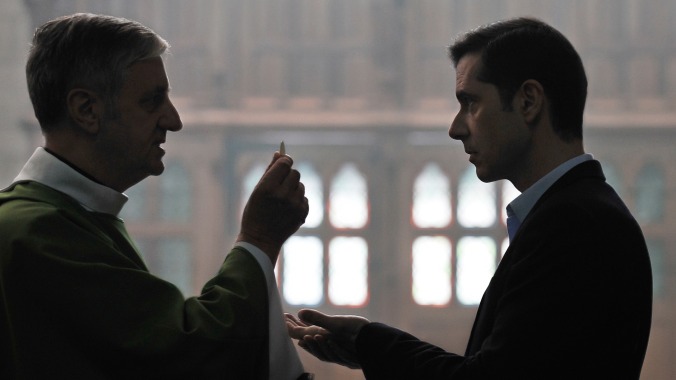There’s little Spotlight urgency in the church-scandal drama By The Grace Of God

It’s easy to forget that Spotlight, which looks reasonably contemporary at a glance, was in fact a period piece: The Boston Globe’s Pulitzer-winning investigative report about child sex abuse committed and enabled by Catholic priests was published in 2002, and took well over a decade to reach the screen. That’s decidedly not the case with its new French counterpart, By The Grace Of God, which dramatizes a real-life church scandal so recent that the legal battle it inspired is still ongoing. Written and directed by François Ozon—a prolific queer filmmaker whose work usually skews more kinky-playful than righteously angry—this measured portrait of lingering emotional trauma focuses squarely on the victims, relegating journalists to minor (and sometimes even oppositional) roles. It’s an approach that yields additional pathos, but at the expense of dramatic momentum; dispensing with all the shoe-leather sleuthing results in two-plus hours of demands for justice and accountability being politely stonewalled, over and over again.
Events get set in motion when Alexandre (Melvil Poupaud, who previously appeared in Ozon’s Time To Leave and Hideaway), a middle-aged family man in Lyon, discovers that the priest who had molested him decades earlier, Father Preynat (Bernard Verley), has recently returned to the region and still regularly works with children. Firing off a letter to the local Cardinal, Alexandre kicks off a series of ass-covering inquiries that lead nowhere, which Ozon depicts largely via sequences in which emails and memoranda are read at length in voiceover. This creates an intriguing, somewhat counterintuitive formal distance—an emotionally charged subject addressed in clinical, officious terms—but the narrative baton soon gets passed to another of Father Preynat’s now-grown victims, François (Denis Ménochet, best known to Americans as the father whose house Hans Landa visits in the opening scene of Inglourious Basterds), who reluctantly begins organizing a support/advocacy group for survivors. The film then shifts focus again, looking in on the more badly damaged Emmanuel (Swann Arlaud) and his futile efforts to forget what happened to him as a boy. Throughout, the church does its best to deflect blame, culminating in the infamous (at least in France) moment when the Cardinal, speaking at a press conference, says that “by the grace of God,” most of the heinous abuse committed by priests falls outside the statute of limitations.
That’s a doozy of a Freudian slip (which he instantly realized and attempted to walk back), but By The Grace Of God doesn’t build to it in a particularly gripping or moving way. Part of the problem may be that Ozon—who, again, has spent the past two decades inventing outrageous stories from whole cloth—felt constrained by the facts. That would explain why he keeps moving from one ostensible protagonist to another, with a correspondingly different tone; one composite character drawing from all three men’s histories might have been more effective, or at least made the film feel less as if it’s restarting from scratch every 40 minutes. Mostly, though, this very empathetic project suffers from an inability to offer anything beyond what one would expect from its synopsis. Its most unexpected and thought-provoking scenes involve Father Preynat himself, who makes no effort whatsoever to deny anyone’s accusation and generally seems bewildered that society at large hadn’t taken steps to deal with his sickness long ago. By The Grace Of God comes messily alive during the couple of instances (near the beginning and the end) when Preynat gets directly confronted by victims who appreciate his candor but are bewildered by his stubborn refusal to apologize or seek their forgiveness. That harrowing dynamic is right up Ozon’s alley, but it gets lost in familiar, pedestrian accounts of post-traumatic stress and bureaucratic evasion.